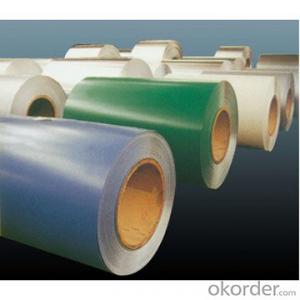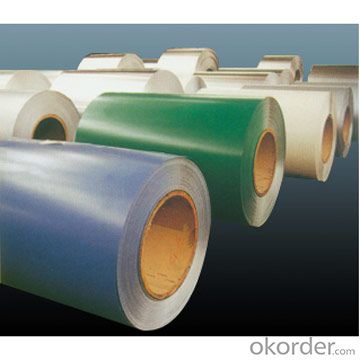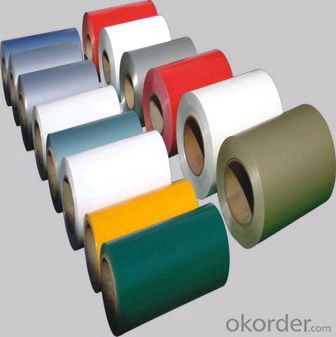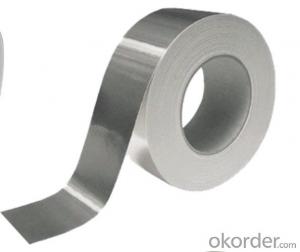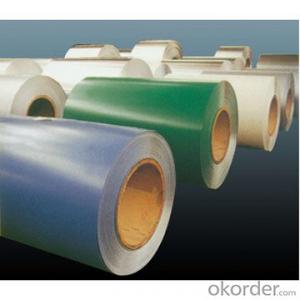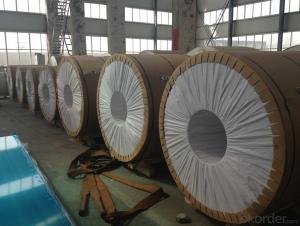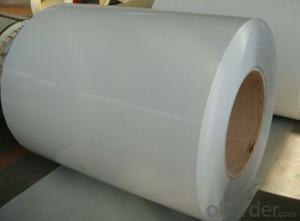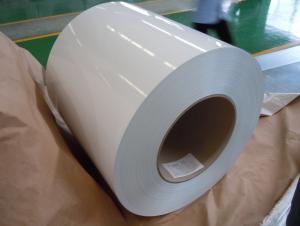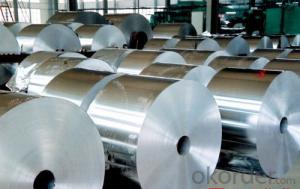Anti-Oxidation Prepainted Aluminum Coil
- Loading Port:
- China Main Port
- Payment Terms:
- TT OR LC
- Min Order Qty:
- -
- Supply Capability:
- -
OKorder Service Pledge
Quality Product, Order Online Tracking, Timely Delivery
OKorder Financial Service
Credit Rating, Credit Services, Credit Purchasing
You Might Also Like
Aluminium alloys with a wide range of properties are used in engineering structures. Alloy systems are classified by a number system (ANSI) or by names indicating their main alloying constituents (DIN and ISO).
The strength and durability of aluminium alloys vary widely, not only as a result of the components of the specific alloy, but also as a result of heat treatments and manufacturing processes. A lack of knowledge of these aspects has from time to time led to improperly designed structures and gained aluminium a bad reputation.
One important structural limitation of aluminium alloys is their fatigue strength. Unlike steels, aluminium alloys have no well-defined fatigue limit, meaning that fatigue failure eventually occurs, under even very small cyclic loadings. This implies that engineers must assess these loads and design for a fixed life rather than an infinite life.
Another important property of aluminium alloys is their sensitivity to heat. Workshop procedures involving heating are complicated by the fact that aluminium, unlike steel, melts without first glowing red. Forming operations where a blow torch is used therefore require some expertise, since no visual signs reveal how close the material is to melting. Aluminium alloys, like all structural alloys, also are subject to internal stresses following heating operations such as welding and casting. The problem with aluminium alloys in this regard is their low melting point, which make them more susceptible to distortions from thermally induced stress relief. Controlled stress relief can be done during manufacturing by heat-treating the parts in an oven, followed by gradual cooling—in effect annealing the stresses.
The low melting point of aluminium alloys has not precluded their use in rocketry; even for use in constructing combustion chambers where gases can reach 3500 K. The Agena upper stage engine used a regeneratively cooled aluminium design for some parts of the nozzle, including the thermally critical throat region.
Another alloy of some value is aluminium bronze (Cu-Al alloy).
The strength and durability of aluminium alloys vary widely, not only as a result of the components of the specific alloy, but also as a result of heat treatments and manufacturing processes. A lack of knowledge of these aspects has from time to time led to improperly designed structures and gained aluminium a bad reputation.
One important structural limitation of aluminium alloys is their fatigue strength. Unlike steels, aluminium alloys have no well-defined fatigue limit, meaning that fatigue failure eventually occurs, under even very small cyclic loadings. This implies that engineers must assess these loads and design for a fixed life rather than an infinite life.
Another important property of aluminium alloys is their sensitivity to heat. Workshop procedures involving heating are complicated by the fact that aluminium, unlike steel, melts without first glowing red. Forming operations where a blow torch is used therefore require some expertise, since no visual signs reveal how close the material is to melting. Aluminium alloys, like all structural alloys, also are subject to internal stresses following heating operations such as welding and casting. The problem with aluminium alloys in this regard is their low melting point, which make them more susceptible to distortions from thermally induced stress relief. Controlled stress relief can be done during manufacturing by heat-treating the parts in an oven, followed by gradual cooling—in effect annealing the stresses.
The low melting point of aluminium alloys has not precluded their use in rocketry; even for use in constructing combustion chambers where gases can reach 3500 K. The Agena upper stage engine used a regeneratively cooled aluminium design for some parts of the nozzle, including the thermally critical throat region.
Another alloy of some value is aluminium bronze (Cu-Al alloy).
- Q: Is it possible to use an aluminum coil as a paperweight for holding down papers?
- <p>Yes, you can use an aluminum coil as a paperweight. Aluminum is a lightweight and sturdy metal that can effectively hold down papers on a desk. Its weight and shape make it suitable for this purpose. However, ensure the coil is clean and smooth to avoid any damage to the papers or surfaces it comes into contact with. Additionally, consider the size and thickness of the coil to ensure it provides enough weight to keep your papers in place.</p>
- Q: What is the composition of aluminum coils?
- Pure aluminum coils typically contain 99.5% aluminum and trace amounts of other elements. Conversely, aluminum alloys are formed by blending aluminum with metals like copper, magnesium, manganese, or zinc. These alloys are specifically engineered to bolster the strength, corrosion resistance, and other desired characteristics of the aluminum coils. The precise composition of the coils may differ based on the particular application and requirements, but in general, they contain a significant proportion of aluminum along with small quantities of other elements to yield a sturdier and more effective product.
- Q: Can aluminum coils be used in agricultural applications?
- Yes, aluminum coils can be used in agricultural applications. Aluminum is a versatile and lightweight material that offers several benefits for agricultural purposes. Aluminum coils are commonly used in various agricultural equipment and structures, such as greenhouse frames, irrigation systems, and grain storage bins. One of the main advantages of using aluminum coils in agricultural applications is their resistance to corrosion. Aluminum is naturally resistant to rust and can withstand exposure to moisture, chemicals, and other elements commonly found in agricultural environments. This makes it a durable and long-lasting choice for agricultural equipment that needs to withstand harsh conditions. Additionally, aluminum coils have excellent thermal conductivity, meaning they can efficiently transfer heat. This property makes aluminum coils suitable for applications such as heat exchangers, which are often used in agricultural machinery like tractors and combine harvesters. Efficient heat transfer helps in maintaining optimal operating temperatures and improving overall equipment performance. Moreover, aluminum coils are lightweight, which makes them easy to handle and transport. This is particularly advantageous in agricultural applications where equipment needs to be moved frequently, such as portable irrigation systems or lightweight structures. The lightweight nature of aluminum also helps reduce fuel consumption in machinery, leading to cost savings and environmental benefits. Furthermore, aluminum is a non-toxic material, making it safe to use in agricultural applications. It does not release any harmful chemicals or leach into the soil, ensuring that crops remain uncontaminated and safe for consumption. In summary, aluminum coils can indeed be used in agricultural applications due to their corrosion resistance, thermal conductivity, lightweight nature, and non-toxic properties. These qualities make aluminum a reliable and efficient choice for various agricultural equipment and structures, contributing to increased productivity and sustainability in the agricultural industry.
- Q: Can aluminum coils be used in the production of cryogenic storage tanks?
- Yes, aluminum coils can be used in the production of cryogenic storage tanks. Aluminum is a suitable material for cryogenic applications due to its low density, high thermal conductivity, and excellent corrosion resistance. These properties make it ideal for storing and transporting cryogenic liquids such as liquid nitrogen, oxygen, and argon. Aluminum coils can be used to fabricate the inner shell of the storage tank, providing a lightweight and durable solution. Additionally, aluminum is easily formable, allowing for the creation of complex tank shapes and designs. However, it is important to note that aluminum has a higher coefficient of thermal expansion compared to other materials like stainless steel, so proper design considerations must be taken to accommodate for thermal contraction and expansion during cryogenic operations.
- Q: Is it possible to utilize an angle grinder for cutting hot rolled aluminum coils?
- <p>Yes, you can use an angle grinder to cut hot rolled aluminum coils, but you must take precautions. Use a grinding disc specifically designed for metal cutting, preferably one with a diamond or carbide grit for better performance on aluminum. Ensure the grinder is equipped with a safety guard and wear appropriate safety gear, including goggles and gloves. Be aware that aluminum can be reactive when heated, so cutting may produce sparks and fumes; ensure proper ventilation. Always follow the manufacturer's guidelines for your specific angle grinder and safety regulations.</p>
- Q: Explain how aluminum coil interacts with magnetic fields and what effects can be observed.
- <p>Aluminum coil itself does not have a direct relationship with magnetic fields in terms of magnetic properties, as aluminum is not a magnetic material and does not get magnetized. However, when an aluminum coil is part of an electrical circuit, it can interact with magnetic fields in the context of electromagnetic induction. If a changing magnetic field passes through an aluminum coil, it can induce an electromotive force (EMF) or voltage in the coil, according to Faraday's law of electromagnetic induction. This induced voltage can cause an electric current to flow through the coil if it is part of a closed circuit. The aluminum coil's primary interaction with magnetic fields is thus through the generation of electrical current when used in conjunction with an electric circuit.</p>
- Q: How are aluminum coils coated to enhance their durability?
- Aluminum coils are coated using various methods to enhance their durability. One common method is the application of a protective coating, such as a polyester or acrylic resin, through a process called coil coating. This involves applying the coating to the surface of the aluminum coil using techniques like roll coating or spray coating. The coating acts as a barrier between the aluminum and external factors like moisture, UV rays, chemicals, and abrasion. It helps prevent corrosion, oxidation, and damage caused by environmental exposure. The type of coating and its thickness can vary depending on the desired level of durability and the intended application of the aluminum coil. In addition to protective coatings, aluminum coils can also undergo other treatments to further enhance their durability. These treatments may include pre-treatment processes like cleaning, etching, and chromating, which improve the adhesion of the coating to the aluminum surface. Other treatments may involve applying primers or topcoats to provide additional protection and improve the appearance of the coil. Overall, the process of coating aluminum coils enhances their durability by providing a protective layer that withstands harsh environmental conditions, extends their lifespan, and maintains their aesthetic appeal.
- Q: Can aluminum coils be used in automotive applications?
- Yes, aluminum coils can be used in automotive applications. Aluminum coils are lightweight, which makes them an excellent choice for automotive manufacturers as it helps to reduce the overall weight of the vehicle. This, in turn, can improve fuel efficiency and performance. Additionally, aluminum coils have excellent heat conductivity, which is crucial in automotive applications where heat dissipation is important. Moreover, aluminum coils have good corrosion resistance, which is particularly beneficial in automotive applications where vehicles are exposed to various weather conditions and road salts. Overall, the use of aluminum coils in automotive applications can provide several advantages such as weight reduction, improved fuel efficiency, better heat dissipation, and enhanced corrosion resistance.
- Q: Can aluminum coils be used for electrical connectors?
- Certainly! Electrical connectors can indeed utilize aluminum coils. This metal, widely employed for electrical connectors, boasts exceptional electrical conductivity, a relatively affordable price, and lightweight characteristics. It finds extensive application in diverse electrical domains such as power transmission, distribution systems, electrical motors, and transformers. Nonetheless, it is crucial to prioritize adequate insulation and protection for the aluminum coils to avert corrosion and guarantee enduring dependability for the electrical connections.
- Q: Can aluminum coils be used in the manufacturing of window frames?
- Window frames can indeed be manufactured using aluminum coils. Aluminum is a widely favored material for producing window frames because of its multitude of benefits. It is lightweight, long-lasting, and has a natural resistance to rust and corrosion, making it applicable for both indoor and outdoor usage. In the extrusion process, which is commonly employed, aluminum coils are heated and pushed through a die to attain the desired shape and size of the window frame. This method provides manufacturers with the flexibility to create window frames in diverse styles and configurations. Moreover, aluminum is highly recyclable, rendering it an environmentally conscious option for window frame production.
Send your message to us
Anti-Oxidation Prepainted Aluminum Coil
- Loading Port:
- China Main Port
- Payment Terms:
- TT OR LC
- Min Order Qty:
- -
- Supply Capability:
- -
OKorder Service Pledge
Quality Product, Order Online Tracking, Timely Delivery
OKorder Financial Service
Credit Rating, Credit Services, Credit Purchasing
Similar products
Hot products
Hot Searches
Related keywords
